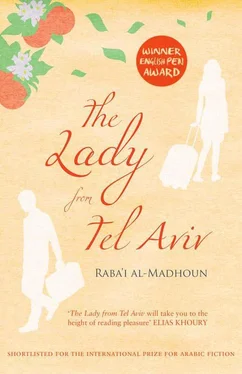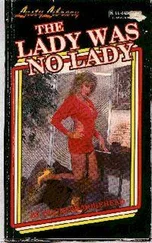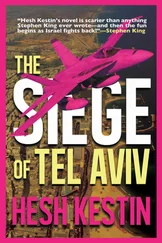The boredom and weariness of the scene finally get to me. My chest tightens and I can feel the tension inside. It intensifies when a young woman suddenly appears from behind the office and says something to her colleague sitting inside. Someone turns up the volume of the music, and the girl starts to dance again, this time like she was in a disco. She is staring at me the whole time, and I try to look the other way. She gives me strange looks as she sings along with the song. Suddenly, I realize she is not singing lyrics — she is singing to me. ‘Hey! Hey you! Hey you over there! Hey there — Walid Dahman!’
I turn to look at her, ‘Yes?’
‘Stay …! Stay right …! Stay right where you are! We …! We are …! We are working on your case!’
She starts to dance again. I decide to get away from her and walk across the room, where I begin to pace back and forth. When I get bored with that, I stand in the middle of the room. As soon as the song stops, another one starts — yet the girl never takes a break from her dancing. I turn to look as far away from her as I can and my eyes catch sight of a small family sitting in a corner at the other end of the building. I see a man in his thirties, shaking an empty plastic water bottle. Next to him, a woman who is a bit younger, a girl maybe five years old, and a boy who is even younger. As they wait, they entertain each other by talking. Whatever they are talking about, it is clearly very Palestinian. When a soldier walks by, the man asks him if he might fill the bottle with water for the children. The politeness in his voice is embarrassing. The soldier agrees. The man’s request awakens my own thirst. My thirst — it has been asleep all day and only now does it decide to wake up. My throat is as dry as a bone. My tongue sits like a hot stone in my mouth. The soldier comes back after filling the bottle with water and he gives it to the little girl who snatches it from his hands. I sit there watching the water pour into the girl’s mouth. To me, it looks like a river flowing over a parched land. I try to swallow, but the only thing that goes down my throat is dryness. When the girl finishes drinking, she sets the bottle on the table in front of them. By now, I have lost my ability to go on looking without asking.
I walk over to the family and ask the man: ‘How long have you all been waiting?’
‘About two hours.’
He asks me to sit down and join them and I do not hesitate, since this was the very thing I was hoping he would ask. I learn from the man that he and his family live in Australia and have citizenship there. It took two days for them to fly here and this is their third day of travel. ‘The trip from Sydney was not as exhausting as the wait at this crossing.’
I tell them a little about my trip, and a fleeting kind of friendship sparks between us — each of us a source of consolation for the VIP treatment we are now receiving. In a paradoxical way, the mistreatment of VIPs is a central strategy in the playbook by which the Israelis abuse all Palestinians, important or not. It is a special form of cruelty since its purpose is to puncture the delusion that the Oslo Accords could protect the importance of anybody.
I ask the man if I can have a drink and he hands me the bottle. What pours down my throat is the first liquid to pass through my lips since midnight yesterday.
My phone rings. It is my cousin, Abdelfettah. He tells me that he called Majda and that she has gone to get my mother’s ID number. He also says that he contacted a Palestinian liaison officer on the other side of the crossing who promised that he would do everything he could to speed up my entry visa. I thank him for everything. Abdelfettah mentions that my mother has been calling him all day long, worrying about me. This last piece of news sends me into a tailspin — since I have no control over whether I will get through today. I tell Abdelfettah to tell my mother what he just told me, since it might reassure her to know that the PA is working on my behalf. I thank Abdelfettah and hang up.
Half an hour later, an Israeli soldier comes up to us and hands the family their documents. Ecstatic, they jump to their feet, not believing their good luck. The man and his wife wish me a speedy exit from this detention centre.
But my release does not arrive for a few more hours. At precisely 5.30 pm, the same first soldier to whom I had presented my papers now informs me that my visa will be ready in five minutes.
Precisely five minutes later, he brings me my passport. For some reason, he apologizes when he hands it to me. Without thinking about it, I thank him and leave.
I see three Palestinian workers walking toward a corridor of some sort and stop one to ask where I go to reach the Palestinian side. He tells me to follow them. I pull my suitcase behind me and struggle to keep up. We enter a wide tunnel whose end I cannot exactly see. The ceiling is arched, like a distant cement sky. The sound of our footsteps echoes back at us like the clomping of horses’ hooves.
Stop. Lift up your shirt so we can see your chest.
I shall obey the voice calling out from a loudspeaker hidden somewhere above me in this vast, terrifying emptiness.
Turn around. Take one step forward. Go to room 2. It will push me through the metal bars into a twisting metal corridor from which I will emerge a broken man. Then I will rush to gather myself up again — but I will not regain my old shape and size until I come out of this cage again on my return to London.
After more than fifteen minutes, the end appears. I reach it by walking toward a plaza that spills onto a shapeless stretch of bare land.
I present my passport to one of the officers in the Palestinian Liaison office, and he seems to forget who I am. He records my name in the big ‘Gaza Arrivals’ register, then he hands it back to me.
I hear someone calling my name, ‘Abu Fadi!’ I turn to see who it is, and there is a lanky young man waving at me. He puts on his prescription glasses. Next to him are two others who are younger. The young man exclaims: ‘So glad you got here safely, cousin! I’m Abdelfettah!’
I give the young man a big warm hug — I am genuinely happy to see him. He introduces me to his two brothers, Salah and Nasser, and I hug them in turn. Then the four of us pile into his car.
The car we ride in is a colourless old Fiat. The ride is bumpy, the asphalt is pockmarked, pitted, and littered with stones, wood and metal debris.
Salah, who sits directly behind me, tells me that the wasteland to the left used to be huge olive orchards until two years ago, when Israeli bulldozers ripped them out. There used to be tens of thousands of trees here. ‘And part of that land used to be an orchard with the best citrus in all of Gaza.’ We turn our heads and look when he says: ‘The land on the right is what’s left of the industrial park. That building, the one covered in soot whose name you can see — that’s the Abu Galyun Tile Factory. That pile of rubble where you see the truck that’s tipped over — that’s what’s left of the Falluji Soft Drink Company.’ Salah tells us about how the entire industrial park was destroyed over six weeks during May and June 2003.
We veer to the right and climb a dirt berm covered with ruts and holes. As soon as we reach the level asphalt road on top, Beit Lahia looms at us like a hill rising from the centre of the earth.
Most of the buildings and homes on the edge of the city were destroyed. Abdelfettah tells me that Israeli tanks had advanced as far as that line before they had had their fill of shelling the neighbourhood. The Israelis had stopped not less than fifty metres from their building, which sits right on the Beit Lahia — Jabalia line.
Читать дальше












